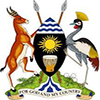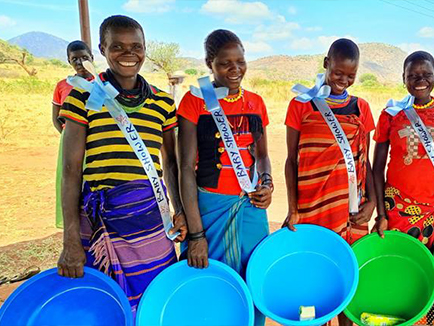Contact Information:
Muhumuza Michelle, mmuhumu2@jhu.edu, +256770731946.
Lydia Pedun Aisu, lpeduna1@jhu.edu +256774425740
In Karamoja, a new initiative is transforming maternal and child health outcomes. Introduced by USAID SBCA through its learning site model, the concept of localized baby showers was widely disseminated to partners during a USAID-led coordination meeting in September 2023. This was followed by visits to the Kaabong learning site in Kathile central sub-county for joint implementation and learning. Inspired by the approach’s potential to positively change perceptions of antenatal care (ANC) and increase service uptake, LPHS-Karamoja expanded the model to the Karenga district in June 2024.
USAID SBCA provided comprehensive training to districts, implementing partners (IPs), and health teams at the sub-county and village levels, covering key aspects of the localized baby shower concept. These baby showers are conducted on ANC days at health facilities or as community outreach based on ANC attendance registers. Health facility midwives, health assistants, and Village Health Teams (VHTs) collaborate with community influencers to mobilize pregnant women, ensuring broad participation. An influential woman, or “cool senga,” leads casual discussions, sharing key health messages and encouraging storytelling, while a midwife provides accurate medical information and records data in the facility ANC register.
During these events, pregnant women are encouraged to wear traditional outfits, including local bead crowns, adding a sense of celebration and cultural pride. Simple gifts like soap, basins, and washing bowls are given to selected women as rewards. The sessions are lively, featuring local songs and dances, games, quizzes, and the decoration of mothers with ribbons and beads. Essential requirements for these events include local ornaments such as ribbons or beads and simple gifts such as soap, sugar, or mosquito nets, following implementation guidelines.
The fun elements of the localized baby showers are a significant draw. Pregnant women share humorous pregnancy experiences, providing lessons and fostering a supportive environment. Folk media, including singing and traditional dancing, games, and quizzes on maternal and child health, add to the festive atmosphere. Pregnant women who keep track of all their appointments are recognized and celebrated, encouraging others to follow suit.
Preliminary results in Kathile sub-county indicate increased ANC attendance from the first trimester through all eight contacts, more facility deliveries, and deeper insights into context-specific barriers and enablers of ANC for targeted interventions. The localized baby showers in Karamoja have not only made ANC attendance more engaging and accessible but also strengthened community bonds among expectant mothers. This innovative approach demonstrates the need to make health interventions more fun, easy, and popular while leveraging existing community structures, norms, and cultural events.
Pull-Out Quote:
“As soon as I saw this baby shower in action, I was intrigued as they were engaging and a good platform for PMTCT bringing mothers who can’t come to the facility easily. I immediately added it to our workplan.” Dr Rebecca Nekaka Deputy Chief of Party, Local Partner Health Services, Karamoja.
Background Information:
USAID SBCA through its learning site model, the concept of localized baby showers was widely disseminated to partners during a USAID-led coordination meeting in September 2023. This was followed by visits to the Kaabong learning site in Kathile central sub-county for joint implementation and learning. Inspired by the approach’s potential to positively change perceptions of antenatal care (ANC) and increase service uptake, LPHS-Karamoja expanded the model to the Karenga district in June 2024.


